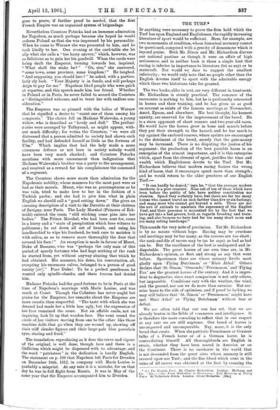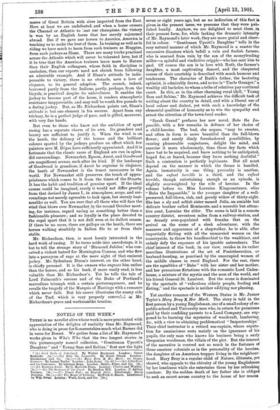THE 11.1.EtF.*
Is' anything were necessary to prove the firm hold which the Turf has upon England and Englishmen, the rapidly increasing
literature of sport would be sufficient. Here, for,example, are two monuments of erudition, whose historical accuracy cannot be questioned, composed with a gravity of demeanour which is beyond praise. Both Mr. Dixon and Mr. Richardson discuss our national pastime as though it were an affair of high seriousness, and in neither book is "there a single hint that
racing is inferior in importance to literature (let us say) or to statecraft. Nor would we. dare to suggest the smallest
inferiority; we would only note that no people other than the English devotes itself to sport with the admirable energy which these two historians take for granted.
The two books, alike in zest, are very different in treatment. Mr. Richardson is sternly practical. The romance of the
racecourse is nothing to . him, but he is profoundly interested in horses and their training, and be has given us as good an account as exists of the famous meetings at Newmarket, Ascot, Epsom, and elsewhere. His best thought, his keenest anxiety, are reserved for the improvement of the breed. He
is a stern opponent of short courses and two-year-old races. He would have the horses grow in bone and muscle before they put their strength to the hazard, and he has much to say against the enclosed courses, where sprints are encouraged to the detriment of the breed, merely that the gate-money may be increased. There is no disputing the justice of-his
argument: the production of the best possible horse is an enterprise of the utmost importance, and it is this enterprise.
which, apart from the element-of sport, justifies the time and wealth which Englishmen devote to the Turf. But Mr. Richardson believes that 'modern racing fosters the wrong kind of horse, that it encourages speed more than strength ; and he would return to the older practices of our English Turf :— " It can hardly be denied," says he, "that the average modern racehorse is a poor creature. Nine out of ten of those which have been before, the public of late -have neither constitution nor stamina. Speed they certainly have, but there are far too many horses who cannot travel an inch farther than five or six furlongs, and many more who cannot get beyond a mile. These are not the sort of animals to maintain the supremacy of the English Turf, and their presence is accounted for by the fact that we have got into a bad groove, both as regards breeding and train- ing, and also because we have had far too many short races and too many selling handicaps."
This sounds the very, note of pessimism. Yet Mr. Richardson is by no means without hope. Racing may be overdone and meetings may be too many,- as the courses are too short; the rank-and-file of racers may be (as he says) as bad as bad can be. But the excellence. of the best is undisputed and in- disputable. The great horses of our own time are, in Mr. Richardson's opinion, as fleet and strong as any that went before. Sportsmen there are whose memory dwells most gladly upon Flying Dutchman' or Blair Athol.' Others declare that St. Simon," Ormonde," Persimmon,' and 'Flying Fox' are the greatest horses of the century. And it is impru- dent to dogmatise, since exact comparison is not only odious, but impossible. Conditions vary with the weather, the wind, and the ground, nor can we do more than surmise. But our- mise leans to the side of optimism, and if proof be lacking we may still believe that St. Simon' or 'Persimmon' might have met Blair Athol' or Flying Dutchman' without fear or defeat.
We are often told that our sun has set, that we are already beaten in the fields of commerce and intelligence. It is therefore the more consoling to reflect that in one respect at any rate we are still supreme. Our breed of horses is unconquered and unconquerable. Nay, more, it is the only breed that exists. When the patriotic Frenchman or German talks of .a French horse or of a German horse, he is contradicting himself. All thoroughbreds are English in strain, whether they have been reared in America or on the Continent. There is no racehorse in the world that is not descended from the great sires whose memory is still revered upon our Turf; and the fine blood which runs in the veins of all racers was obtained at the first by crossing the
• (1.) The _English Turf. By Charles Richardson. London: Methuen and Co. [155.j.---7-12.) From atadiatsur to Persimuon: Turf Momorim of Thirty roars. By Sydeuhazu Dixon. Loudon Urant Richards. [18..] mares of Great Britain with sires imported from the East. Here at least we are undefeated, and when a horse crosses the Channel or Atlantic to :Rat our champions, the victory Is won by an English horse that has merely sojourned abroad. But if we gave our horses to America, America is teaching us to make the best of them. In training as well as in riding we have much to learn from such trainers as Huggins, from such jockeys as Sloan. There are many tricks practised across the Atlantic which will never be tolerated. here, but if it be true that the American trainers leave more to Nature than their English colleagues, whose faith in discipline is unshaken, then our experts need not shrink from following an admirable example. And if Sloan's attitude be indis- pensable to victory, there is no obstacle, save a love of elegance, to its general adoption. The crouch, indeed, borrowed partly from the Indians, partly, perhaps, from the bicycle, is practical despite its unloveliness. It enables the jockey to become part of the horse, it renders atmospheric resistance inappreciable, and may well be worth five pounds to a daring jockey. But., as Mr. Richardson points out, Sloan's attitude is but one element in his success. Apart from any trickery, he is a perfect judge of pace, and is gifted, moreover, with very fine hands.
But even to those who know not the ambition of sport racing has a separate charm of its own. Its grandeur and beauty are sufficient to justify it. When the wind is on the heath, the delicacy of the horses and the brilliant colours sported by the jockeys produce an effect whieh few painters save M. Degas have sufficiently appreciated. And it is fortunate that the classic races of England are run in splen- did surroundings. Newmarket, Epsom, Ascot, and Goodwood are magnificent arenas, each after its kind. If the landscape of Goodwood is grandiose, if Ascot be supreme in elegance, the heath of Newmarket is the truest racecourse in the world. For Newmarket still preserves the touch of appro- priateness which comes to it from the times of the Stuarts. It haa the habit and tradition of genuine sport. If the ideal course could be imagined, surely it would not differ greatly from that devised by James I., in atmosphere, scope, and sur- roundings not merely agreeable to look upon, but sternly busi- nesslike as well. You are sure that all those who will face the wind that blows over Newmarket in the second October meet- ing, for instance, regard racing as something better than a fashionable pleasure ; and so loyally is the place devoted to the regal sport that it is not dull even at its dullest season. If there be no races, there are gallops on the heath, there are horses walking stealthily in Indian file to or from their stable.
Mr. Richardson, then, is most keenly interested in the hard work of racing. If he turns aside into anecdota.ge, it is but to tell the strange story of Diamond Jubilee,' who con- ceived a violent hatred for Mornington Cannon, and who flew into a paroxysm of rage at the mere sight of that eminent jockey. Mr. Syclenham Dixon's interest, on the other hand, is chiefly personal. It is the owners who engross him rather than the horses, and so his book, if more easily read, is less valuable than Mr. Richardsor's. Yet he tells the tale of Lord Falmouth's success and of the Duke of Portland's marvellous triumph with a certain picturesqueness, and he recalls the tragedy of the Marquis of Hastings with a romance which never fails. But his career illustrates the seamy side of the Turf, which is very properly concealed In Mr. Richardson's grave and workmanlike treatise.







































 Previous page
Previous page